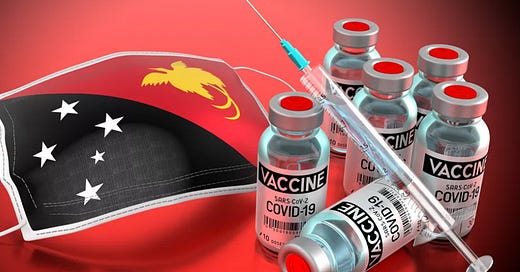Countries with high Covid vaccine hesitancy. What were the outcomes?
What one of the world’s least vaccinated countries can teach us about real-world outcomes
Hello and welcome back. It has been a few days since my last update, and today I want to reflect on something that stopped me in my tracks. It came from an unlikely place. A gold mining conference in Canada. That’s right. A CEO from K92 Mining, which operates out of Papua New Guinea, mentioned that despite extremely low vaccination rates, their operations in the country had not seen the kind of pandemic experience we might expect.
He asked the simple question. Why has no one looked into this?
As someone who has spent the past four years buried in the science of COVID-19, I could not resist. I had to dig deeper. And what I found was both stunning and unsettling.
McCall, Chris. "Disrupted care in Papua New Guinea: the harms of COVID-19." The Lancet 399.10321 (2022): 226-227.
A Country That Said No
Papua New Guinea is a country of about 9 million people. It is largely rural. About 85 percent of the population lives outside major urban areas. Access to healthcare is limited. Internet and phone access are minimal in many regions. Vaccine delivery is challenging at the best of times.
So it was no surprise that when COVID-19 vaccines were rolled out, there was deep hesitancy. In a 2021 survey, 53 percent of respondents said they had no intention of getting vaccinated. Only 4 percent of the population ended up receiving a single dose.
Now, by the logic that dominated global policy, Papua New Guinea should have been devastated. We were told that low vaccination equals disaster. But that is not what happened.
The drivers of COVID-19 vaccine hesitancy and how to address them: Evidence from Papua New Guinea
Real World Data
Let’s compare Papua New Guinea with Australia, its neighbor just to the south.
Australia had an 87 percent vaccination rate. It closed borders. It enforced mandates. It heavily restricted movement. And yet, after opening up in early 2022, the country experienced a massive wave of infections and over 18,000 COVID deaths.
Now look at Papua New Guinea. With only 4.15 percent of the population vaccinated, they recorded just 670 deaths in total. That’s not a typo. Fewer than 700 deaths over the course of the pandemic, despite almost no vaccination and no major lockdown measures.
I know what you’re thinking. Underreporting, right? But that only goes so far. People on the ground, including those in international operations, are saying the same thing. They did not see the kind of pandemic impact predicted.
This is not a trivial observation. This is a scientific anomaly that should demand immediate attention.
Could Natural Immunity Be the Key?
One possible explanation is that Papua New Guinea, with its limited exposure to industrial air pollution, medications, and metabolic disease, has a population with more robust natural immunity. But even that theory has its limits.
What about early treatments? Or was there another factor?
There is an interesting footnote in the public health history of Papua New Guinea. In 2021, as part of a World Health Organization initiative, the country undertook a mass drug administration campaign to combat lymphatic filariasis. The treatment included a combination of three medications—albendazole, DEC, and ivermectin.
Coincidence? Possibly. But in science, coincidences with consistent patterns deserve attention.
Papua New Guinea steps up efforts to eliminate lymphatic filariasis
When Outcomes Defy Assumptions
I have always said we must follow the data, even when it does not align with our expectations. Papua New Guinea has become a real-world control group, unintentionally created by vaccine hesitancy and logistical challenges. And instead of ignoring their experience, we should be asking how and why this happened.
What if they got something right that we missed?
We are still seeing excess mortality in highly vaccinated regions. We are still debating whether multiple boosters were helpful or harmful. Meanwhile, a country that said no is quietly getting on with life.
This is not an argument against vaccines. It is an argument for scientific curiosity and intellectual honesty.
Let Us Be Brave Enough to Ask
Papua New Guinea’s story is not widely known. It is not trending in headlines. But it may hold answers we desperately need. It may help us understand how to build resilient health systems and how to prepare better for the future.
We cannot be so committed to our narratives that we miss the truth sitting quietly outside the spotlight.
Let us ask the question. Let us do the research. Let us learn what really works, even if the answer comes from a place we did not expect.
Because in the end, outcomes are what matter.
Thank you for reading. Please join me on this journey to question, reflect, and seek better answers.








Thank you Dr. McM for this beyond interesting post.
Thank you